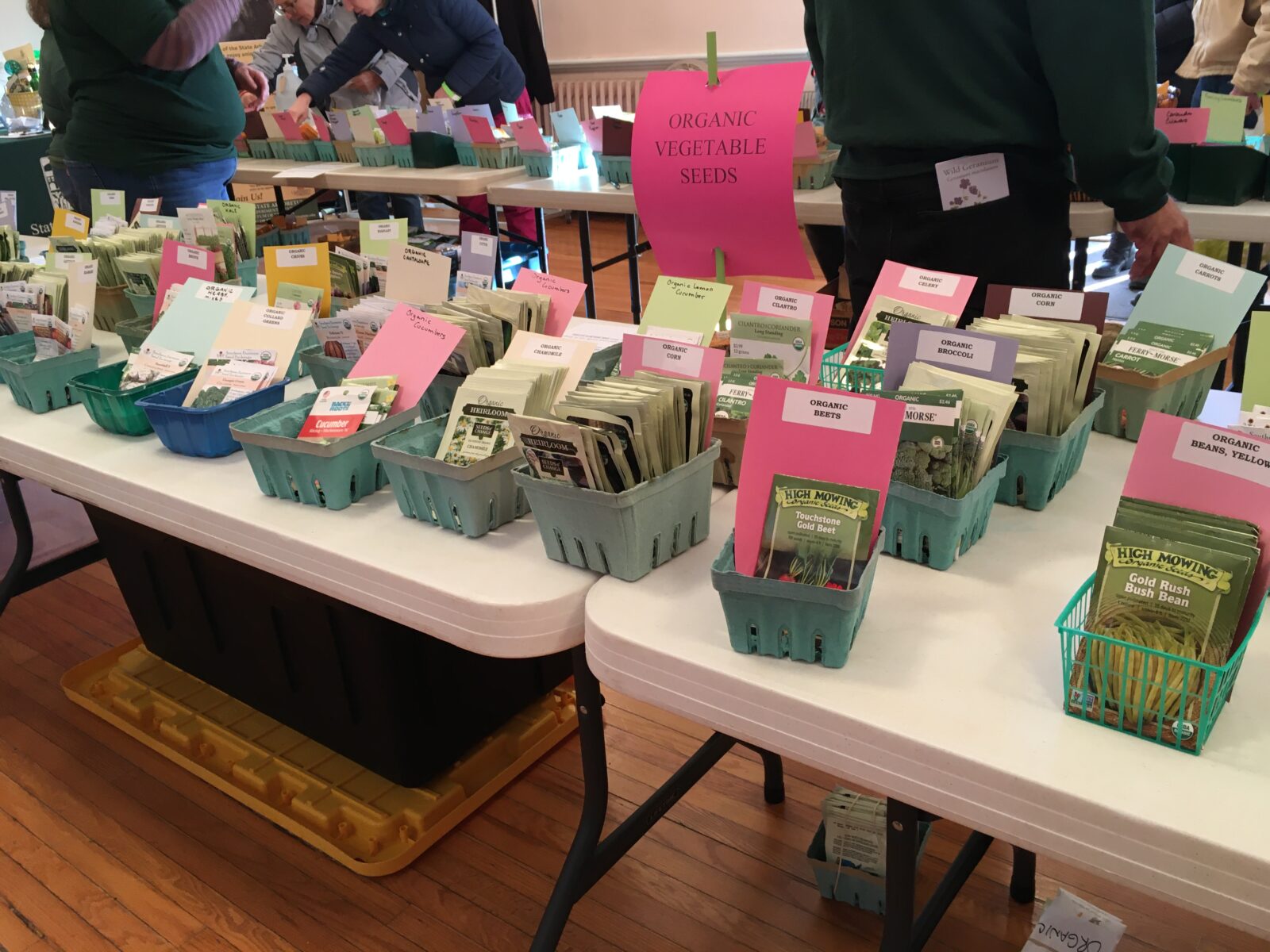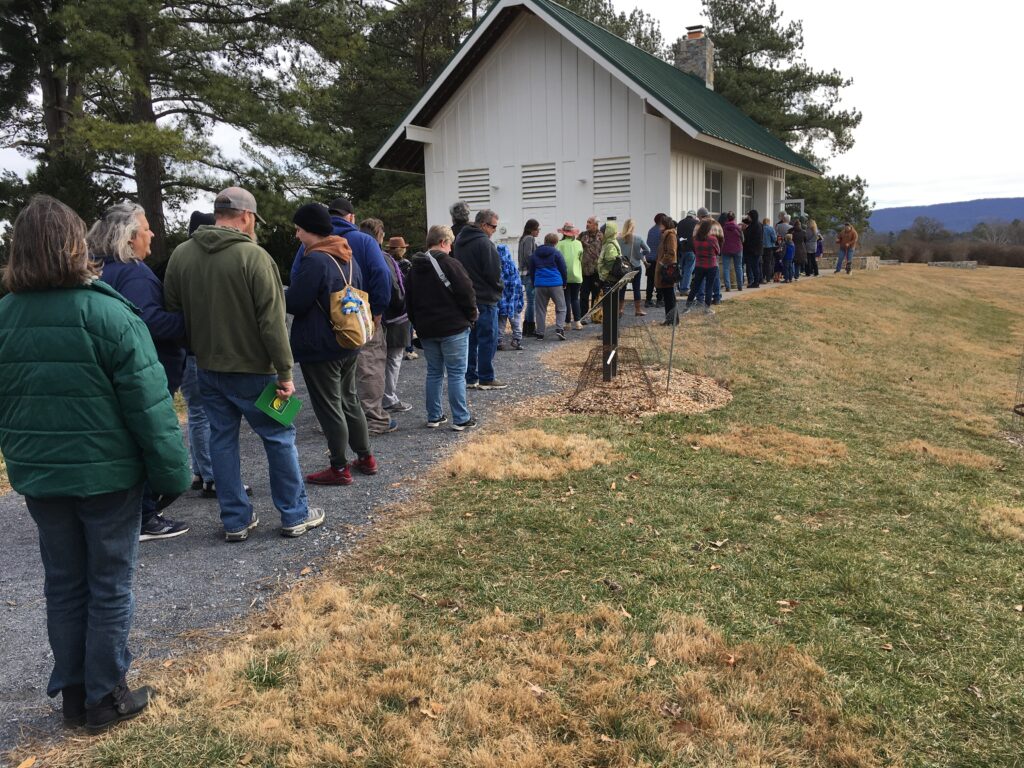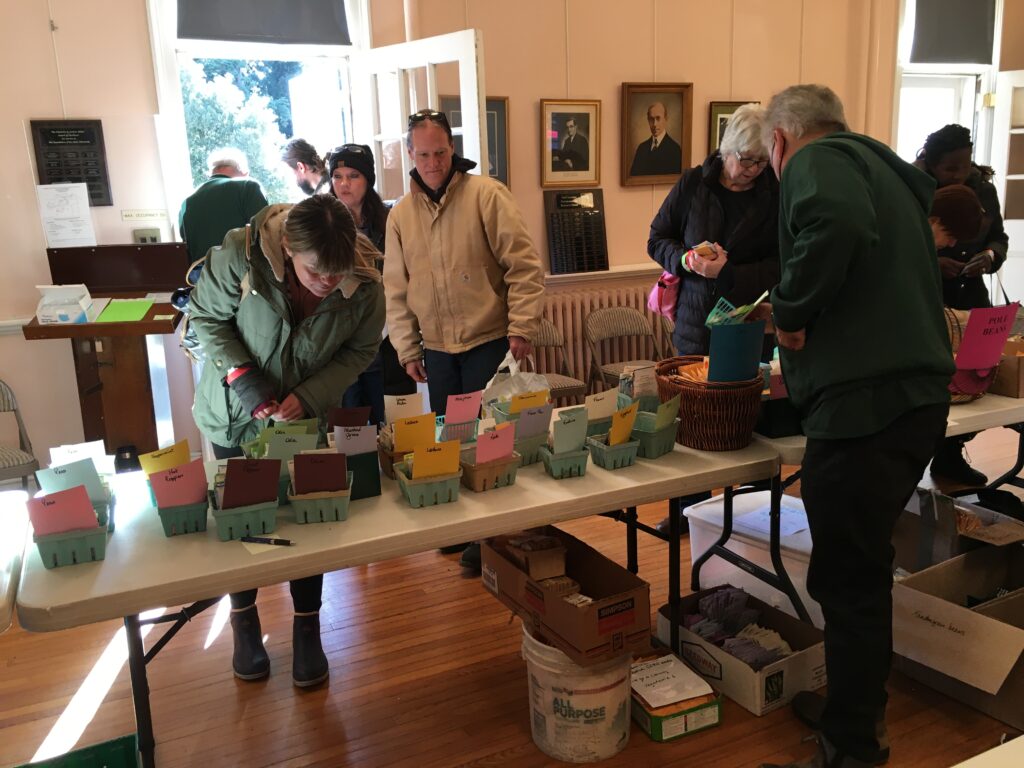Seed Swap: Blandy Experimental Farm Cultivates a Winter Tradition

Written by Bill Kent | Photos courtesy of Rochelle Dornatt
Ann Follansbee will never forget the cold Saturday in January when she wrapped herself in her warmest coat and drove an hour north from her Edinburg home to the Blandy Experimental Farm in Boyce. There she found herself among hundreds of seed collectors, some coming from as far away as Ohio and New Jersey.
“It was the coldest, snowiest day in January we’ve had in some time,” she recalls. “Walking through the snow and blowing wind from building to building only enhanced the warmth and friendliness. So many families with small children, bundled to the eyebrows, came to learn and to share their knowledge and love of gardens in the depth of winter.”

A retired school teacher with a small organic vegetable garden, Follansbee heard from a friend that the Shenandoah Valley Master Gardeners Association Seed Exchange is the largest of a handful of the Commonwealth’s annual seasonal seed swaps. “I came away that day not only with a fistful of seeds to try, but with a resolution to save some of my seeds to share the following year. I have attended ever since.”
Now in its 12th year, the winter rite takes place on January 27 from 10 a.m. to 2 p.m. Admission, parking, gardening books, planting advice, and the seeds themselves are free. Attendees need not bring seeds to go home with them.
“If you love living things, this can be one of those places where you find your people,” says Master Gardener Joanne Royaltey, one of more than 50 participants from Hunt Country who have been saving seeds since June to contribute to the event. “You can learn the story behind the seeds.”
“And you can be fearless,” adds fellow Master Gardener Rochelle Dornatt. “You can take risks. You can try plants that are new to you. Because most of the seeds we give away were raised here by master gardeners, they’re more resilient and better suited to our environment. Come springtime, you’ll be pleasantly surprised with your results.”
Dr. Laura Dabinett agrees. A member of the Garden Conservancy, she is using seeds from the exchange to restore portions of her 100-acre Clark County farm. “Since we have made a concerted effort to plant natives, we have seen a surge in native birds and insects on our farm. These include monarch butterflies, luna moths, hummingbird hawk-moths, and lots more bees. We have also noticed an increase in goldfinches, kestrels, hummingbirds, and meadowlarks. We have even had bald eagles, barred owls, and sharp-shinned hawks.”
People have swapped seeds long before the Virginia Tech Cooperative Extension Program’s Master Gardeners organized them. Such staples as corn, potatoes, and peanuts were bred and modified by centuries of native tribal cultivation until they were brought to Europe by traders, and then taken back to the Americas. Native tribes also shared some of those seeds with European colonists.
Joshua Kincaid, an environmental studies professor at Shenandoah University, calls seed swaps “a form of community engagement where you are not just sharing seeds. You are also sharing and passing on cultural knowledge and ideas to friends, neighbors, and strangers. In this way you are maintaining and spreading certain varieties of plants and the valuable cultural knowledge and ideas that come with that.”
He adds that beyond what money you might save by acquiring the seeds for free, “you are also more likely to get varieties of plants that are better suited for the local climate and environment.” These seeds are most likely to become plants more resilient to bugs and blights.

“Swaps represent a reservoir of genetic diversity that is necessary for biodiversity, food security, and modern agriculture,” he continues. “It has been estimated that it takes 13 units of fossil fuel energy to produce one unit of food energy because of all the links in the seed-to-table supply chain. That means you have a food system extremely vulnerable to fluctuating fossil fuel prices and availability. By swapping and growing local seed, you are removing several of those fossil fuel-dependent links in the supply chain, which is also good in terms of air quality, water quality, and public health.”
For that reason, Fairfax County will open its third seed “lending” library inside its George Mason Regional Library in Annandale on the following Sunday, January 28, at 3 p.m.
“We want to grow a community of local gardeners,” explains librarian Laurel Jackson, who collaborated with the Green Spring Master Gardeners to acquire donations for Fairfax’s John Marshall seed bank. Seed packets with printed planting instructions will be available for interested gardeners without charge, and without a library card. Those who want to share their seeds can also leave them at the library.
Her inventory at John Marshall is small, but growing. “So far we have spinach, two varieties of tomatoes, nasturtiums, and a ton of zinnias.”
To make this year’s the biggest Shenandoah Valley seed exchange ever, the master gardeners have coaxed seed donations from local garden centers, as well as from the gardens of the Bell Grove Plantation in Middletown and Luray’s Birdsong Pleasure Garden.
The staff of the State Arboretum at Blandy are also contributing seeds. Jack Monsted, the Arboretum’s assistant curator of nature trails, has gathered six different kinds of wildflower seeds from the Arboretum’s meadow. “They can be planted any time,” he advises, in pots or in open spaces. “I have a tiny wildflower meadow in front of my house. It’s easier, and prettier, and more inviting to wildlife than a lawn.”
So far, Shenandoah Master Gardeners Association President Jennifer Flitton Adams has counted “about 7,000 seed packets to give away, plus an assortment of bulbs and cuttings,” she says. “We have 90 pounds of open-pollinated corn, 40 pounds of green beans, and at least 171 paw-paw seeds.”
For those considering participating in a seed swap, Adams advises, “Be thoughtful with what you share.” Bring seeds that are no more than two years old. Avoid any seed on the Virginia Invasive Species list (dcr.virginia.gov/natural-heritage/invsppdflist). Do not bring seeds from hybrids, copywritten varieties, or GMO plants. Master gardeners on site will do their best to identify unknown seeds, as well as provide advice about planting.
And remember to dress warmly! ML
Published in the January 2024 issue of Middleburg Life.








